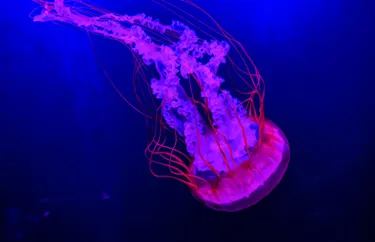A-peel-ing creatures: This World Jellyfish Day, SEA LIFE London Aquarium reminds Brits not to pee on jelly stings!
- Friday 1st November 2024

SEA LIFE London Aquarium is preparing to jelly-brate World Jellyfish Day (3rd November) by finding out how much the nation really knows about these incredible creatures, whilst educating them on a day that’s dedicated to honouring and raising awareness of the mysterious invertebrates and their role in the environment.
With plenty of myths floating around about the weird and wonderful creatures, including that peeing on a jellyfish sting is the best method to treat the unfortunate incident – made popular by the beloved TV show, Friends - it’s therefore no surprise that 41% of UK adults are still hooked on the remedy!
However, the favourite TV show has fooled us. Drew Gervais, Jellyologist at SEA LIFE London Aquarium sets the record straight, saying: “You should absolutely NOT pee on a jellyfish sting! The best action without making a pee-saster is to remove any tentacles still attached to the affected area, wash with hot water and wrap in a hot compress.”
Another common question about these mysterious creatures is whether they have brains. Nearly a third (32%) of those polled correctly identified that they don’t, whilst 42% were left floundering in uncertainty. Drew dives deeper, explaining: “Jellyfish don’t have much of anything, no brain, heart or eyes! But this certainly does not mean they are simple creatures. They have a set of nerves commonly called a nerve net or nerve ring instead of a brain. It's their built-in defence mechanism against the sea's more ruthless residents. Quite a 'jelly' good system, if you ask me!”
Floating around is a misconception that ALL jellyfish are venomous. Nearly 7 in 10 (69%) of UK adults believe that all jellies are scientifically proven to be dangerous to humans. Drew clears the waters, saying: “Even though those tentacles can certainly seem a bit intimidating, it’s important to remember, while all jellyfish can sting to some degree, not all are painful and hazardous to life.”
In a first for SEA LIFE’s UK attractions, SEA LIFE London Aquarium has bred Chrysaora fuscescens also known as the Pacific Sea Nettle, a rare feat in the UK which sees the talented team reproducing hundreds of baby jellyfish through strobilation, which can be full sized adults within a couple of months.
There continues to be a surge in sightings of these a-pee-ling creatures across the UK. This is linked to the rising sea temperatures due to global warming creating more favourable environments for jellyfish to thrive in by accelerating their growth and extending their breeding seasons, but overfishing and habitat destruction can also play a huge role.
Drew comments: “It’s crucial to educate on these amazing creatures to ensure their future. It’s amazing to see so many jellyfish but the consequences could be that the increase in jellyfish will deplete the waters of food and nutrients that other species need to survive, so balance is vital.”
This World Jellyfish Day, SEA LIFE London Aquarium invites you to get up close and personal with these mesmerising marine marvels at the Ocean Invaders, the UK’s largest jellyfish experience. Journey into the fascinating world of jellyfish through three unique interactive zones and discover the sea-crets of these ancient creatures, from their hypnotic movements to their surprising survival skills.
SEA LIFE London Aquarium, situated on the South Bank, is open seven days a week. For the latest opening times, feeding times, prices and more see http://www.visitsealife.com/london/